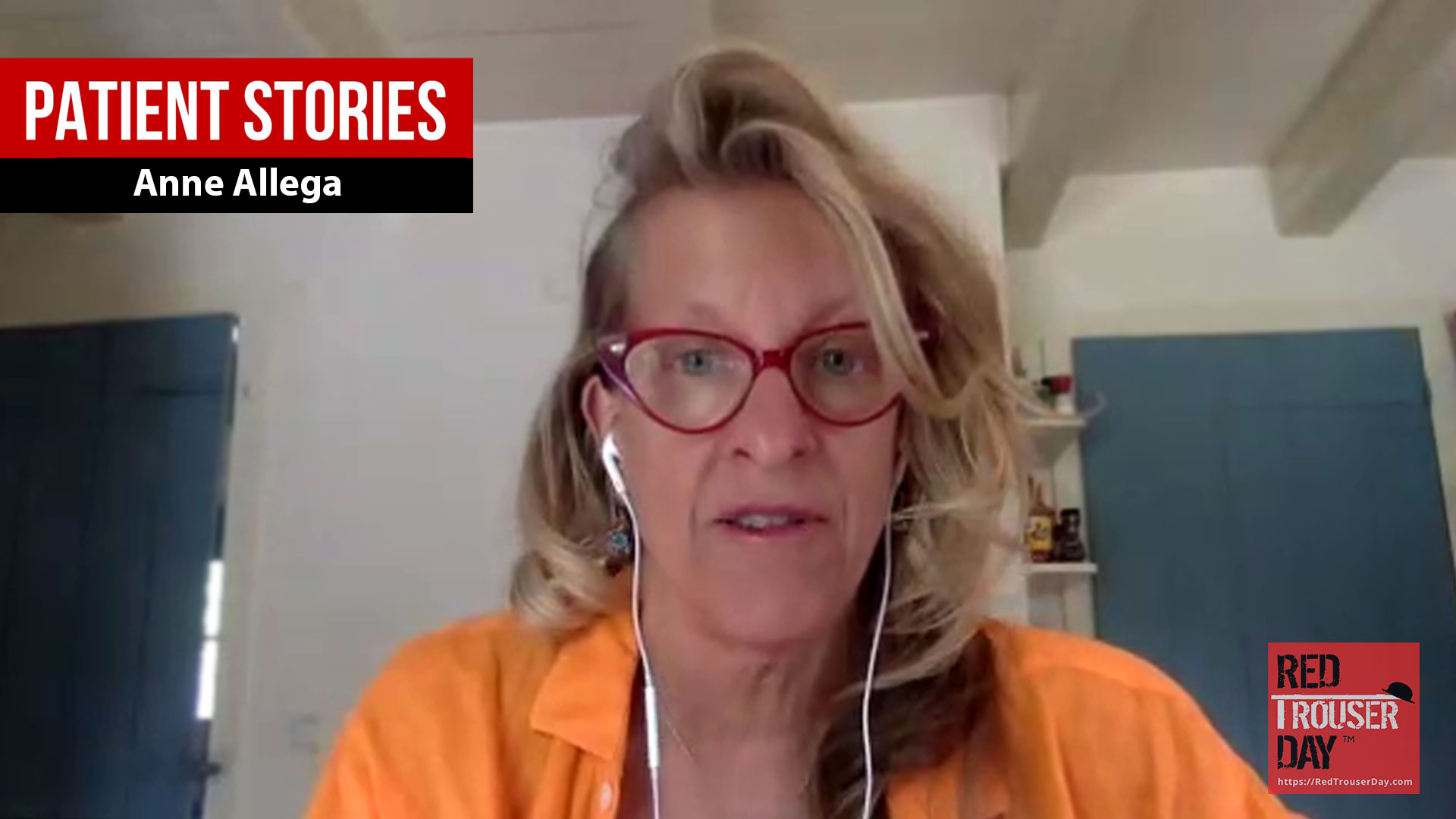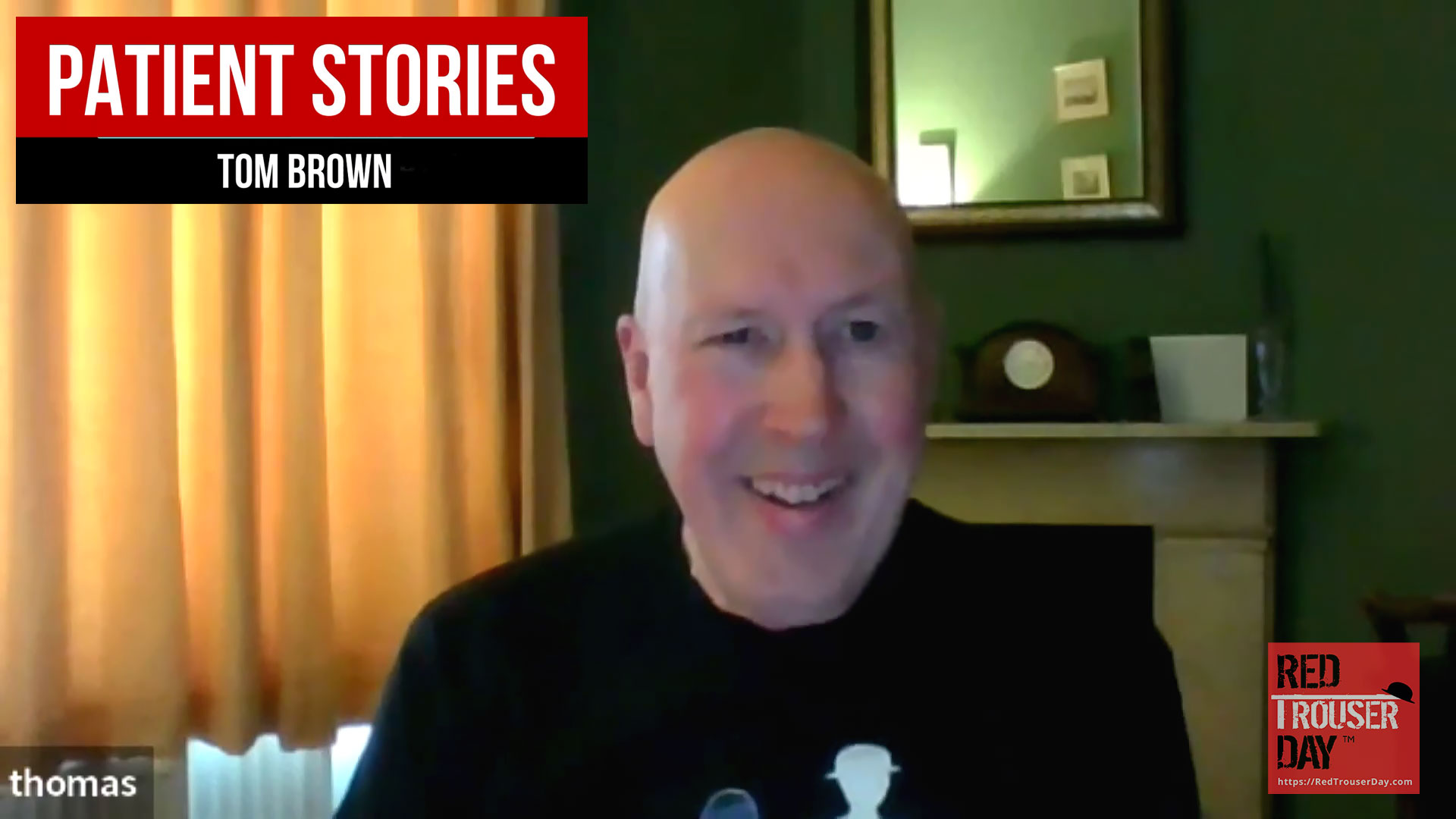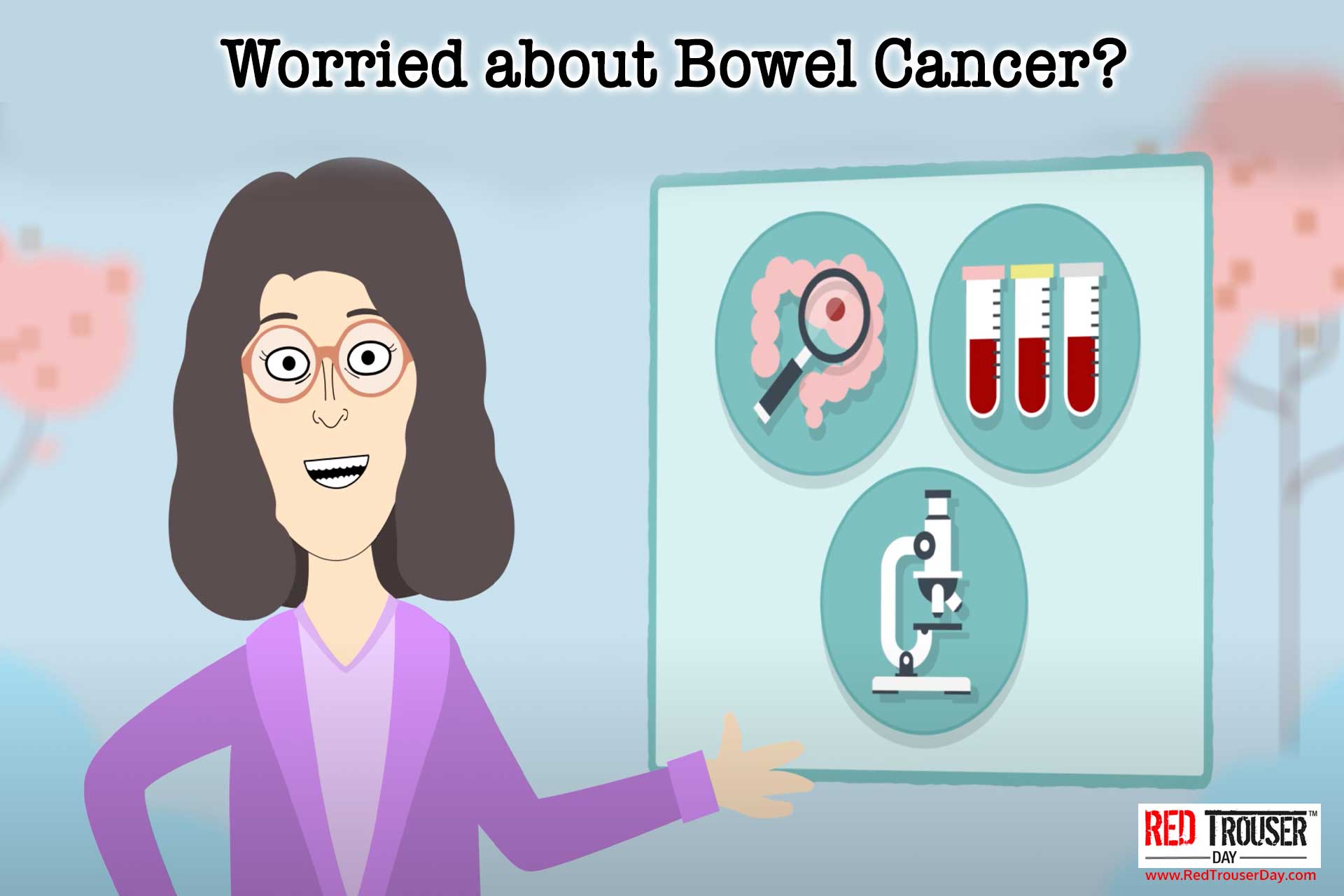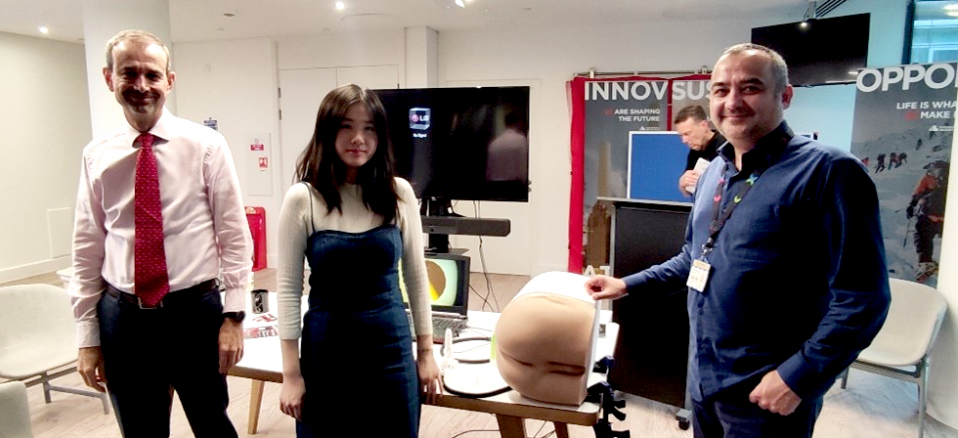Top 10 Ways of coping with the stressful journey through the medical system.
Coping with bowel cancer treatment …
When you are diagnosed with cancer, or any life threatening illness your world falls apart instantaneously. Your normality disintegrates, and is replaced by anxiety, fear and uncertainty. You know the doctors have your best interests at heart, and the treatment is going to be the best you can get, yet doubt remains. The future is uncertain and filled with challenges as you go through the rollercoaster ride of hospital appointments, treatments and emotions.
One thing than can help on your journey is your outlook on things; a positive attitude has been shown to be beneficial to recovery . But every patient’s journey is unique, even if they have one thing in common – you’re struggling to contain the stress.
So, at Red Trouser Day we polled our members to find the ways in which they coped during their journey, the little things that made a big difference psychologically. Some of these tips might be for you, others not so much.
So here are our Top 10 Tips to dealing with your Bowel Cancer treatment (as presented by ambassadors of Red Trouser Day who have been or still are patients going through Bowel Cancer treatment)
1: For every bad experience, create a good experience
Going to hospital can be very stressful; even relatively mundane things like having a scan or talking to a doctor takes its toll. Over time it can leave you feeling battered and hopeless.
Some of our members found it helped to plan to do something nice after a trip to the medical professionals. For example, have a meal in a nice restaurant, or meet friends for a coffee in a place you really like, or simply to wander around a park or museum.
Take the moment to observe the world around you, get off that treadmill for a while and appreciate the little things, the colour & scent of a flower, drifting clouds in the blue sky, the taste of a great meal. Find something that has meaning to you and make the time to do it after every bad experience. It will help sustain your mood and prevent the negative emotions taking over.
2: Don’t be afraid to ask
Doctors and healthcare professionals are highly trained individuals who have your best interests at heart. But at the end of the day you are the only one responsible for your life; you need to be as informed as possible. Don’t just take for granted that the plan of action given to you is the best option, or that it is the only solution.
Get informed, read everything about your illness (caution; be careful on such information, seek guidance on the reliable sources), learn about the various treatments offered to you, and talk to other people who have been in a similar situation. Also don’t be afraid to get a second opinion, or a third opinion, either on the NHS or privately if you feel it might be of benefit. (Macmillan’s advice on getting second opinions: )
The chances are in this day & age you are going to get exactly the right treatment for your medical condition. But many people feel intimidated raising their voices when they don’t understand something or are accepting of going along for the ride.
If your research and conversations lead you to the conclusion the treatment plan you are on is the right course of action, then that’s great – you can relax knowing you have the best possible treatment. If not, and you have that niggling feeling in the pit of your stomach that something is not right, then you have to say something. If you have a less than ideal outcome you will always wonder ‘what if? Or ‘if only I had said something’!
3: Don’t feel obliged to tell Everyone about your illness
When you get the bad news that you have a cancer your immediate reaction might be to reach out and explain your feelings to people you know. Often this is a good thing as you will get a supportive hand from those you tell.
However, some of our members found that it was good not to tell everyone they knew about their illness, but keep it confined to a few close friends and immediate family. The reason is you might want some aspects of your life to remain relatively normal. For example, going to a social event you might want to blend in and create a sense of normality, rather than being surrounded by people with concerned looks in their eyes, and a downcast appearance.
Sometimes it’s better to be selective about who you tell. But of course, this decision is entirely up to you.
4: Have your “A” Team of support ready
One reason not to want to communicate continuously to all friends and family is that it can get really tiring to field calls, texts, emails, etc., continuously through your treatment, from all who care about you.
One way out of this is for a loved one, or a few selected loved ones, to form your A Team of support – people you feel will understand when you don’t want to talk and who will gladly be there when you do. Amongst them, there will be one or two who can act as a bridge between you and your wider circle of friends and family who are concerned and want to know how you are getting on.
5: Plan to take time off work, a lot of time, but don’t stop living
Work and money will be huge worries for most people when they get their diagnosis. Try to sort out as much as possible before you start treatment. If you are fortunate enough to be able to stop work, don’t hesitate to take up the option. There is no question, your oncologists will write you off sick for the entire duration of any radiotherapy or chemotherapy course of treatment if you wish. Some people want to continue working, but if you do, the arrangements must be secure to protect your health. You cannot afford to be near colleagues who could pass on their colds to you. ‘My health comes first’ – this must be your guiding light after your diagnosis.
When you’re going through chemotherapy cycles, plan something new for each of your weeks out of treatment, maybe a visit or an experience you’d been wanting to do but never had time. You’re allowed to treat yourself but remember ‘your health comes first’ and don’t expose your weakened immune system to huge extra risks by visiting crowded places, using public transport when crowded or wearing yourself out.
6: Fighting may not be for you
If anyone says ‘you’ve got to fight it’,, this is a very personal experience and only you know the right approach. We are all individuals and some people may take that approach, others will need to be guided, don’t be frightened to ask for support, no need to sweat it out on your own. You have an illness, and you will resting and having excellent treatment and the best frame of mind is cooperation with treatment, trying to de-stress, not pretending you’re re-living the Battle of Britain.
7: The Treatment Journey
Knowledge of your own treatment stages and timing knowing of what comes next will reduce anxiety. In discussion with the oncologist and every medical professional you meet in the treatment process questioning what happens next by when will reduce your anxiety the further you progress down the treatment timetable.
Treatment process, stages and timing will change as you progress. Try to have your partner or a friend with you at each review session because you will not hear everything that is said to you, anxiety about each stage outcome sometimes impairs your attentiveness. Having your own agenda for the meeting, asking your own questions and keeping notes will help you to constantly check your treatment process to ensure that you are comfortable, and the outcomes are clearer.
Keeping you own meeting notes will help you confirm with the medical professional that your treatment outcomes are beneficial in your own terms help you review progress post meeting and reduce anxiety.
It’s important to understand that a medical professional has compassion for your situation but is primarily there to guide you to the best outcome for your condition given your current medical status.
Quite often there are measurable benchmarks for your status, solid cancerous tumours have staging – ask for your staging when it becomes available, and it helps understand the treatment progress. You are entitled to copies of all tests and results in writing, don’t be frightened to ask. Copies of blood test results can really help steer a diet to improve your immune system.
8: The Recovery and Recuperation
Physical and mental well-being goals help recovery.
After surgery you may have to “enjoy” some bed rest. Make sure you organise your day to get out of bed and enjoy the day and not over rest in bed. Set yourself some physical goals that are well within your age and physical capability Check with the physiotherapist or surgeon before leaving hospital about setting physical goals. Moving from 1000 steps a day over a personal timetable to 10,000 steps a day is one simple objective.
Mental wellbeing – remember your partner may become your best carer post-surgery and they will have been stressed by the event so take time out to discuss how with them and not confront during recuperation.
9: Macmillan are informative
Do read all the excellent booklets produced by Macmillan concerning your cancer. They are a large resource of honest and good information including coping with bowel cancer.
10: What do you tell the children?
Difficult and personal – views from two of our members about coping with bowel cancer and what they told their children:
Protect them:
The most desperate thing for many people will clearly be if you have young children – what do you tell them? I have no wisdom or experience to offer here, but I hope others do. However, I did lose my own father when I was nearly 5, and I knew from the day we came back from St.George’s that he ‘had died and gone to heaven’. I think the truth and reality was the best thing, I can’t imagine spinning fantasies can be good. Children surely have to learn how to accept bad news.
Tell the truth:
I didn’t tell my son anything until after it was all over. I didn’t want him to be worried and let it affect his school work. I even cut my hair short to disguise the fact I was having chemo – fortunately my hair didn’t fall out! Not so easy for woman undergoing treatment I guess. When I wasn’t well I let him know I was tired and needed to rest, but didn’t let him know why. Only when it was nearing the operation did I say I had to have an operation, but it wasn’t a big deal, and didn’t give specifics as to what it was. Also didn’t let him come to the hospital – Royal Marsden cancer ward would have let the cat out the bag! Only months afterwards did I let him know, by which time I was well and he couldn’t worry about it. He got good grades that year.
We hope you have found these suggestions for coping with bowel cancer useful, if you have any suggestions of your own or wish to share your own experiences please feel free to Contact Us










